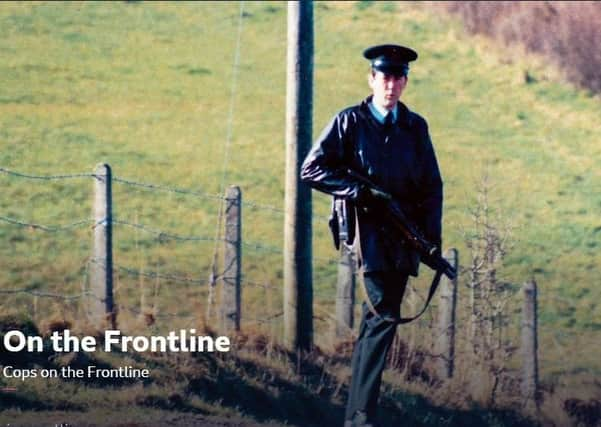Former RUC officers open up on life in Troubles frontline


As well as archive footage showing the extraordinary work carried out in the face of terrorist atrocities, 11 former members of the Royal Ulster Constabulary give harrowing first-hand accounts of devotion to duty and personal sacrifice.
Contributors include a male officer who lost both legs, a policewoman shot in the back and another left paralysed by an IRA landmine.
Advertisement
Hide AdAdvertisement
Hide AdCops on the Frontline has been released online as part of a Frontline boxset featuring the work of the Northern Ireland emergency services and other challenging vocations. The documentaries are due to be broadcast on BBC NI television next month.
Speaking on camera, former inspector Alan Douglas explains his decision to contribute.
“I don’t want it to go down in history that the Royal Ulster Constabulary was responsible for the Troubles. We didn’t start the fire – we put the fire out.”
He added: “A terrorist was a terrorist and it didn’t matter which camp you came from. You were using violence against innocent people.”
Advertisement
Hide AdAdvertisement
Hide AdThe personal sacrifice of the Catholics who decided to join the RUC was often even greater than that of their Protestant counterparts – with many being singled out for persistent targeting by terrorists, being ostracised by former friends and even family members, and even being forced to give up certain sports.
Former inspector Danny Brennan said: “All I wanted to do was to join the police to help people...it didn’t matter who they were.
“The one thing I found most difficult was the loss of the GAA. I don’t think I should have been prohibited from playing the sport I loved.”
However, he added: “I knew what I was doing was honest and right.”
Advertisement
Hide AdAdvertisement
Hide AdThe Police Federation for NI described the film as a “heart-wrenching and honest testimony from our former colleagues as they relay experiences in frontline policing during the Troubles, and added: “History cannot be allowed to distort their contribution.”
In a Twitter message, chief constable Simon Byrne said he “will watch this with interest.”
Michael Graham, the son of former detective constable Anne Graham who took part in the documentary, said: “I am in awe of the courage shown by both my parents as serving officers, alongside their brave colleagues.”
Responding to Mr Graham’s tweet, the film’s producer and director Gerry Gregg said: “So you should be Michael. Anne is a great woman and all of us who made the film are grateful to all our contributors for coming forward and courageously recording their testimonies about the dark days they faced on duty on the frontline.”
Advertisement
Hide AdAdvertisement
Hide AdDr Aaron Edwards, a lecturer in international security, described it as “one of the most significant documentaries to have been produced by BBC Northern Ireland in years.”
A number of former police officers among the first to view the film online posted their approval on Facebook.
One said: As I watched it I was filled with both pride and sadness and reminded of the risks and realities of serving as an RUC officer; and how some suffered more than others. Each participant modestly told their story with dignity and without bitterness.”
Concluding the documentary, ex-inspector Douglas reveals his RUC service has taken its toll on his emotional well-being, but added: “If it brings peace to this country, I would do it again.”
Advertisement
Hide AdAdvertisement
Hide AdDr William Matchett, a former Special Branch officer and author of Secret Victory: The Intelligence War that Beat the IRA, said it was “important to get the practitioners’ perspective heard,” which has, to date, been “largely been drowned out by technocrats, academics and politicians”.
He said: “The courage of 11 officers going on camera to relate their experiences first-hand should not be underestimated.
“It was a privilege to serve in a police organisation with men and women of this calibre. And as is patently evident, for many it took a terrible toll.”
Dr Matchett added: “Without police officers like this, Northern Ireland in its darkest days would have been far worse than it was. We owe them so much.”